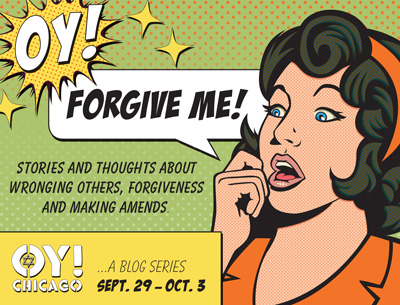Behind the hurtful words
Permanent link All Posts
One of the most poignant moments in couples therapy work is the “Reframe.” That’s the moment when they have an epiphany – in the midst of all their anger and frustration – that they are both longing to be close to each other. Behind all the painful words on the surface is a craving to be close. All the hurtful comments are actually “reframed” as intense cries for help, love, and connection. This deeper understanding of each other and their dynamic is a very powerful moment. The Reframe is the beginning of the relationship healing.

This therapeutic platform was actually taught to the world over 3,000 years ago by the leading marital therapist of all times, a man by the name of Aaron the Cohen. It is written that two friends or a couple were in a quarrel which had reached the point that neither was willing to talk to the other anymore. Aaron sought them out. Known as the Pursuer of Peace, Aaron spoke with each of them individually. As he met with the first and counseled him, Aaron told him, “I saw your friend/spouse yesterday. She is so sad! She misses you so much! Oh how she regrets so much what she said and did to you. She wants so much to be close and connect with you again!” And he would say the same to her about him. By the time Aaron was through, they were in tears about what had happened, and they were out looking for their spouse to make amends. When they finally reached each other, they embraced and poured out their hearts sharing how much they had missed the other and how happy they were to be reunited, not ever wanting to be apart again.
In couples therapy, we also hope to tap into this underlying reality. We will even softly conjecture with them that perhaps the bantering, criticism, and even the yelling, is really a cover for a soft cry of loneliness and wanting to be loved. With the couple, we work through the mess of the conflict with the goal of hopefully revealing a purity of the heart and its untainted desires for closeness underneath it all.
But there’s one baffling piece to this insightful story. Aaron the Cohen didn’t know! How could he be so sure they were deep down in love with each other, feeling these yearnings to be close? They never told him their feelings. Aren’t we a people of truth? Doesn’t he want to confirm his conjecture before so boldly running after them to save the friendship/marriage?
There’s a beautiful answer to this quandary, and I think it sheds great light on our lives. The answer is, simply, Aaron actually knew. Without having to ask them, he could see the truth. He could see beneath all the mess of fighting, arguing, and distancing from each other. Aaron saw beyond the exterior angst. His vision penetrated their emotional worlds. He could see beyond the facade of their harsh reactions tapping into their deep longings for each other, their needs to love and be loved. He was not lying to anyone when he told them how their spouse/friend felt. He was just sharing with them what he saw. With his profound vision and insight, he rightfully earned his title, the Pursuer of Peace.
We have moments in our lives where we feel conflict. Often, it occurs with the ones we are closest to – our spouse, parents, friends, or other relatives. Do we want to be in these heavy painful moments? Of course not. Most often, deep down, we’d like to resolve the conflict and feel close again with them. But how do we get ourselves out of it? How can we forgive when we feel so much pain? How do we let go of the hurt we feel? These are moments where we must be a people with great vision, like Aaron the Cohen.
Our tradition teaches us that forgiveness is much more than letting go. The truth is, deep down, our loved ones are crying inside to be close to us, as are we to them. We do not try to get around the conflict; rather we go straight to the core of it. And at its core, conflict is most often a longing to be close.
Imagine if the husband could see that his wife’s anger for arriving home late is really a cry for him to spend more time with her, to connect, and how much she longs to be near him? What if the wife could see that her husband is distancing from her because he’s afraid she doesn’t see him as a good husband and how much he longs for her to appreciate him but is ashamed to tell her? What if the close friend who never calls actually cherishes the friendship and is really scared to be seen as a nag fearing to end up unwanted? We all desperately desire connection, to be loved and cared for, especially by those we feel closest to, and especially when we feel hurt or judged by them.
The time for forgiveness is here. With effort and vision, we can expand our perceptions and see beyond the surface level confrontations. Perhaps we can follow in the footsteps of the great Pursuer of Peace, Aaron the Cohen, and we will see the love, the longing, and the yearning for connections between us and those around us. May it be a year of peace, forgiveness, and true love for all.
To read more posts in the “Oy! Forgive Me!” blog series, click here
Joshua Marder is a rabbi and licensed marriage and family therapist. He is the Director of Chicago YJP, a division of The Lois & Wilfred Lefkovich Chicago Torah Network: Home for the Wondering Jew.



.jpg)



